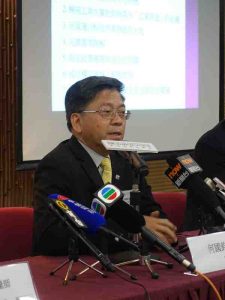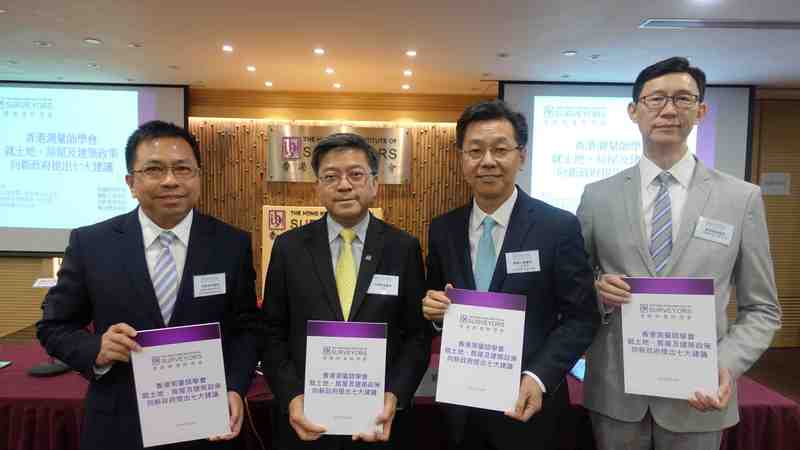(20 July 2017, Hong Kong) Since the inauguration of the new HKSAR Government, its land and housing policies have been a prior concern to society. The Hong Kong Institute of Surveyors (hereafter the HKIS) made 7 key suggestions to the new Government at a press conference today, in hopes of refining the land, housing and building policies in Hong Kong, speeding up the increase in housing and land supply and improving the safety of current buildings.

Sr Thomas HO, President of the HKIS commented, “The land and housing policies of the Government are closely related to people’s livelihood and pose a direct impact on the supply of new buildings in the future. The HKIS supports the Government to explore all possible strategies to increase Hong Kong’s land supply. We hope to refine relevant policies and alleviate housing demand of different social strata with professional advices from the HKIS.”
Sr Thomas Ho has great concern over the continuous slow progress in funding approval of public building and infrastructure projects in the Legislative Council in recent years. This has caused profound impacts on the livelihood of practitioners and professionals in the construction industry, as well as the students who are studying in the relevant construction programmes. The HKIS urges the stakeholders to prioritise the overall interests of the community and the Government should coordinate and balance the needs of different stakeholders, promptly resolve the public works project funding proposals and to maintain the sustainable development of the community.
7 Key Suggestions to Review Current Situation in Hong Kong
1. To Facilitate Private Sector’s Participation in Land Supply
In addition to developing government land, the Government should explore all possible strategies to increase Hong Kong’s land supply, including facilitating the private sector’s participation in increasing the supply of developable land to unlock the privately-owned land resources. The planning processes and land administration should also be streamlined to accelerate housing development.
2. To Review Definitions of “Industrial Use” under Land Grants
The Lands Department should review the land grants of industrial buildings and redefine the definition of “industrial use” according to the latest changes in the market, such as including other permissible land use in order to utilise the “industrial” properties in a more efficient way.
3. To Relocate Brownfield Sites
The operation of brownfield sites plays a pivotal role in Hong Kong’s economy, but most of them cannot be accommodated within multi-storey buildings. To relocate lands for more suitable developments, the Government should identify appropriate alternative locations with necessary infrastructures such as access roads, drainage and sewage system for the brownfield sites operators to relocate.
4. To Reconstruct the Housing Ladder
The HKIS suggests to add a new category of subsidised housing for those who are not eligible for Home Ownership Scheme (HOS) and cannot afford private housing. It also helps reconstructing the housing ladder. Analysis shows that if the down payment of a property is 10%, a household income exceeding $52,000 per month can afford a property of $5 million and above, meanwhile $52,000 is the current limit for HOS.
5. To Formulate Policies for Elderly-Friendly Housing
Hong Kong’s rapid ageing population reiterates the necessity of a corresponding policy to implement the objective of “Aging in Place”. The HKIS is conducting a study on the issue and will promulgate its recommendations soon. Principally, there are a few suggestions: (1) formulate polices for Housing for Senior Citizens and Age-friendly Design, (2) incorporate housing and facilities for the elderly into Hong
Kong Planning Standards and Guidelines, (3) establish a centralised policy bureau to deal with elderly issues in the long run.
6. To Set up Building Repair & Maintenance Works Authority
The HKIS has proposed to the Government to establish a Statutory Building Repair & Maintenance Works Authority (BRMA) to regulate the market and practitioners of building repair and maintenance works for private buildings in multi-ownership. A Building Repair & Maintenance Works Authority Committee (BRMAC) as a transitional body could be set up during the transitional period. The HKIS reiterates the urgency for the Government to consider this proposal. Also, managing building maintenance and repair works requires extensive professional knowledge, the Home Affairs Department should strengthen the co-operation with other relevant bureau and/ or departments to promote the knowledge and culture of maintenance and repair works to the general public.
7. To Improve Safety and Environment of Sub-divided Units
The safety and hygiene conditions of many Sub-divided Units (the “SDUs”) are below acceptable level and not complying with the Buildings Ordinance.. In the short run, the HKIS suggests the Government formulate a separate set of interim design and construction requirements to gauge improvement works to the unacceptable units and to facilitate conversion of new SDUs in a controlled manner. In addition, incentive policy could be implemented to encourage upgrading of sub-standard SDUs alongside with enforcement actions to phase-out the sub-standard SDUs in the long run. In parallel, the Government should provide sufficient transitional housing in order to accommodate the occupants of SDUs affected by the improvement works or enforcement actions. The Government should seriously explore the possibility of provision of transitional housing units by erection of temporary buildings on unallocated government land or conversion of vacant government buildings etc.













